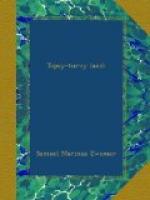[Illustration: PEARL MERCHANTS.]
In his tent the Arab is very lazy. His only occupation is feeding his horses or milking his camels. The Arab girls go out to take care of the flocks while the wife performs all the domestic duties. She grinds wheat in the hand-mill; kneads and bakes bread; makes butter by shaking the milk in a leather bag; fetches water in a skin; works at the loom and is busy all the time. The Arab smokes his pipe, drinks coffee and talks to his friends; unless he is on the march or on a robbery excursion his life seems very lazy.
[Illustration: ARABIAN WATER-BOTTLE.]
Scarcely any of the Bedouin can read, and they have neither schools nor mosques. The Bedouin sometimes say, “Mohammed’s religion cannot have been intended for us; it demands washings, but we have no water; alms, but we have no money; pilgrimage to Mecca, but we are always wandering and God is everywhere.” Yet outwardly they observe the Moslem religion of which they know so little. In our next chapter you will read how earnestly even the nomad children pray in the desert. And I believe God loves these sons of Ishmael and will yet bring them back to Abraham’s faith. Don’t you think so too?
X
NOORAH’S PRAYER
For many days the sailing craft from Bahrein had been unloading Indian wares at the port of Ojeir on the Hassa coast, and for many hours the busy throng of Bedouin drivers and merchants and onlookers were loading the caravan, emphasising their task or their impatience with great oaths, almost as guttural and angry as the noise of the camels. At length, with the pious cry of Tawakalna, “we have trusted in God,” they are off.
A caravan is composed of companies, and while the whole host numbered seven hundred camels, with merchants and travellers and drivers, our company from Ojeir to Hofhoof counted only six. There was Salih and Nasir, a second son of the desert, both from Riad; a poor unfortunate lad with stumpy hands and feet, who limped about on rag shoes and seemed quite happy; there was Noorah and her sister, and lastly, the missionary.
But for the shuffling of the desert sand and the whack of a driving stick the caravan marched in silence. The sun shone full in our faces as it slowly sank in the west, its last rays coloured the clouds hanging over the lowlands of Hassa a bright red, and when it disappeared we heard the sheikhs of the companies, one after the other, call to prayer. Only a part of the caravan responded. The Turkish soldiers on horseback kept on their way; the most pious of the merchants had already urged their beasts ahead of the rest and had finished a duty that interfered with a speedy journey and the first choice of location at the night encampment; some excused themselves by quoting a Koran text, and others took no notice of the call. Not so the Bedouin child Noorah and




